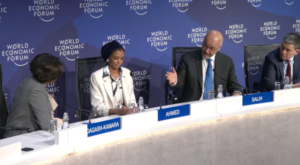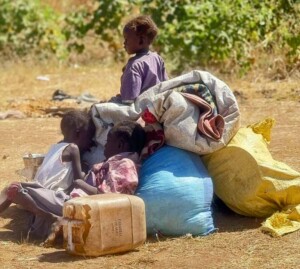Interview: The dilemma between peace vs justice in Sudan
Victim participation must be the crucial focus of transitional justice in Sudan, according to Prof Brianne McGonigle Leyh, an Associate Professor at the Netherlands Institute of Human Rights (SIM) within the Faculty of Law, Economics and Governance of Utrecht University, and an attorney specialising in human rights, victims’ rights, accountability for serious human-rights violations, and transitional justice.
 Prof Brianne McGonigle Leyh (Picture: Ed van Rijswijk/Utrecht University)
Prof Brianne McGonigle Leyh (Picture: Ed van Rijswijk/Utrecht University)
Victim participation must be the crucial focus of transitional justice in Sudan, according to Prof Brianne McGonigle Leyh, an Associate Professor at the Netherlands Institute of Human Rights (SIM) within the Faculty of Law, Economics and Governance of Utrecht University, and an attorney specialising in human rights, victims’ rights, accountability for serious human-rights violations, and transitional justice.
Interviewed by Mohammed Elgizoly Adam of Radio Dabanga, Prof Brianne McGonigle Leyh offers an international perspective on transitional justice, how it has unfolded in other post-revolution/conflict societies worldwide, and the four pillars on which it rests, namely truth, accountability, reparation, and guarantees of non-repetition.
She stresses the what differentiates transitional justice from other transitional processes such as development and rule of law programming is that the transitional justice process focuses primarily on victims.
She cites the UN definition of transitional justice as “the full range of practices and mechanisms associated with a society’s attempt to come to terms with a legacy of large scale past abuses, in order to ensure accountability and serve justice, and achieve reconciliation”.
Listen to the interview (MP3) or
Read the full interview below:
The developments in Sudan since the December revolution have highlighted challenges such as peace, justice, and other human rights issues. Radio Dabanga has developed a new programme regarding transitional justice as a decisive issue at such a crucial and historical time in the country.
Radio Dabanga has conducted several interviews with Sudanese professionals about transitional justice and the expected challenges that might occur during the process.
“The way I usually start talking about transitional justice is in relation to, also parallel, and often larger processes that take place after a serious conflict. These other processes are often referred to as ‘rule of law programming’ and ‘development programming’; their, let’s say, smaller, younger sister is transitional justice programming”, Prof McGonigle Leyh says.
She clarifies that the transitional justice process focus primarily on victims and that is what differentiates transitional justice from the other larger processes such as rule of law and development programmes.
However, development programming makes no distinction between perpetrators, victims, bystanders. Rule of law is the same; it really looks at society as a whole, she says.
With regard to the definition of transitional justice’s she explains that the United Nations has defined transitional justice as the full range of practices and mechanisms associated with a society’s attempt to come to terms with a legacy of large scale past abuses, in order to ensure accountability and serve justice, and achieve reconciliation.
‘There are essentially four pillars that have really come about within the field of transitional justice: Truth, accountability, reparation, and guarantees of non-repetition… These pillars are all about society’s attempt at looking back at the past harms, in order to address them from a victim-centred point of view’ – Prof Brianne McGonigle Leyh
Since that definition was adopted in the early 2000s, there are essentially four pillars that have really come about within the field of transitional justice. These pillars are all about society’s attempt at looking back at the past harms, in order to address them from a victim-centred point of view. So, the four pillars include truth, accountability, reparation and guarantees of non-repetition, and I’d be happy to talk about each of these pillars and what they could mean in terms of transitional justice.
The four pillars
These are processes that societies around the world have adopted in order to really uncover how crimes were committed, the historical processes that led to them, perhaps the inequalities, the structural inequalities that could have led to them. The various mechanisms range from truth commissions, the most famous being the South African Truth and Reconciliation Commission, but it can also include commissions of inquiry, or historical commissions, and it really depends on how a state or society would like that truth commission or truth process to take shape.
However, generally, if a truth commission is set up, it comprises of a group of experts, they can be from the country but also outsiders. They investigate through documents but also lots of interviews. The truth commissioner of Tunisia, for example, has looked at over 65,000 victim statements, and they’ve interviewed over 20,000 individuals. So, these are really large processes, and the experts then put together a final report, and in that report, they usually put forward recommendations to the state on how to better address the harms that were suffered by the victims. This can include reparations, or accountability, or archives being set up, or the establishment of a human rights institution. It can really be any number of recommendations, Prof McGonigle Leyh says.
Justice
This can include anything from administrative processes – where individuals who were maybe tied to past abusive regimes can be vetted or removed from certain offices – and it can also include criminal trial processes, so more retributive justice, where investigations and prosecutions take place domestically, or if that’s not possible, internationally or even regionally in a handful of situations.
Reparation
This process is mainly where victims and victim communities get to, through dialogue and consultation, get to outline their needs and concerns. Reparations can be awarded through a criminal process, but that is usually a very narrow subset of reparations, but it’s better to more administrative, larger processes.
It can be tied to truth, or it can be separate, but reparations, there are generally five types, and they can be individual or collective. They include, restitution, in the case of someone’s house has been taken or destroyed; restitution may require returning that house to the individual concerned, while compensation is another form of reparation. If restitution is not possible, then that individual should be compensated financially for their loss.
Rehabilitation is also a form of reparation, this is if an individual has suffered either a physical or mental impairment, then rehabilitation programmes can help that individual live the best life possible. Then you have satisfaction, there is a lot that falls under satisfaction, but it can include public apologies, or memorials. Guarantees of non-repetition, which is a specific type of reparation targeted at the state, so it would require the state to implement human rights trainings, or legal reforms.
Now, these usually happen under rule of law programming, but you could, for example, find in a reparations process an award where local police or security forces are required to undergo ethics or human rights training. That could be awarded through reparations process and would be viewed as a guarantee of non-repetition, so as to ensure that if those individuals or institutions were involved in violations, that there is some sort of preventive measure to try to stop those types of violations occurring in the future.
Guarantees of non-repetition
This is also a form of reparation, but it can be separate from it, and these are largely legal in nature, so this is where the overlap, where the rule of law programming takes place the most and it includes security sector reform, but it also includes educational initiatives. For example, how is the conflict taught in schools? How is it being dealt with by local communities? So, to ensure that the violations do not occur again. This is the most understudied within the field but it can perhaps have the most impact in the sense of trying to establish a sustainable peace.
‘All societies confronted with serious and mass human rights violations, war crimes, crimes against humanity, and genocide, have struggled with the peace vs justice issue…’
– Prof Brianne McGonigle Leyh
On the peace vs justice issue, Prof McGonigle Leyh explained that all societies confronted with serious and mass human rights violations, war crimes and crimes against humanity and genocide, have struggled with this issue. The peace versus justice debate is an ongoing one. What I find very interesting from a scholarship perspective, is that “even in those societies that opt for a more robust peace or stability response initially, and put justice and accountability on the backburner, even those societies tend to turn back to question of justice and accountability within a generation, and certainly within two generations. There is no statute of limitations for these types of crimes.”
For crimes rising to the level of war crimes, crimes against humanity and genocide, there is no statute of limitations which means that 25 years can pass, and prosecutions can take shape. So, if we look at Argentina as an example, there they really opted peace, they put amnesties in place; they opted for no prosecutions initially, in order to stabilise the country. Currently, we have seen more than 4,000 domestic prosecutions for the crimes which occurred 20, 30 years ago. Still, that’s not a wonderful response for victims who are demanding justice and accountability now, but that’s certainly not necessarily the best way.
Other countries and societies have demanded justice immediately, and these processes take time, in and of themselves. But, if we look at Rwanda and the genocide that took place there, they had multiple processes for accountability taking shape, quite soon after the genocide. So, not only at the International Criminal Tribunal for Rwanda that was taking place outside of the country, with limited cooperation of the country, but within Rwanda, they had a system – Gacaca is probably the most well-known of what they were doing – but they were also undertaking more traditional, criminal prosecutions of offenders.
These took a long time, and there is of course there some issue in terms of tensions of accused and the length of the process, but taken as a whole, you can see that the country really went to great efforts to try to hold all levels of individuals responsible through various accountability processes: Gacaca as well as the more traditional process.
Sudanese legal system
Concerning the question of whether or not the Sudanese judiciary system has the capacity to deal with the grave violation of human rights and international humanitarian laws, Prof McGonigle Leyh maintains that much depends, for the facts that transitional justice processes do not operate in a vacuum.
They are closely tied to the political processes that are taking shape. What we have seen as a great stride in a country, along the lines of transitional justice where, thinking of the example of Tunisia, the creation and work of the truth commission was really held out, particularly by the international community, as this amazing example in line with human rights and looking at issues of gender and all types of crimes and violations, economic, social and cultural rights combined with civil and political rights.
It was really seen as this wonderful mix, but then, because of the political situation, when it came out with its report, nothing happened. Absolutely nothing happened. The report was shoved into a drawer and the drawer was shut. There was hope that after the elections in October in Tunisia, things would change, but so much depends on the political climate and the willingness of representatives to bring it forward. They are prioritising perhaps, other things over transitional justice.
That happens a lot. So, there is no clear answer of whether there should be a sequencing of events like first, legal reforms, and then the establishment of a transitional justice commission. I don’t necessarily think one way is better than another.
What is crucial is that whether it gets set up immediately, at the same time as the legal reform, and perhaps that commission could comment upon those legal reforms, or rather, it gets established after; what is crucial is having the political support behind it. We see that in all examples around the world, political support is just crucial. One of the reasons why the South African Truth and Reconciliation Commission was so successful, was because it had Archbishop Desmond Tutu and President Nelson Mandela behind it. They were really the champions of these processes, and that really helped in those unstable moments. Without that support and without those uniting figureheads, it can be an absolute challenge and can sometimes actually mean the end of transitional justice taking shape, regionally or nationally. I think I would say the sequencing is less important than the maintenance and garnering the sustainable political will behind these types of processes.
Victim participation and representation
Time and again what we have seen in various political peace negotiations or transition periods is that the victims get side-lined. When that happens, political compromises are made without taking into account their needs and concerns. There is probably one international example where it is perhaps seen as a new way forward, and that is the situation in Colombia. As far as I’m aware, this was the first and only time victims’ representatives were actually voted on through different victim groups that had formed.
They then picked 40 representatives and of those forty they picked an additional, I forget exactly how many, but a smaller number to actually take part in the political negotiation process. They were at the table, with the Colombian government, with the FARC, and you had victim representatives. This has never happened before and what we see from what came out of it, is that it’s hugely significant for victim populations because their needs and concerns were considered in all of the negotiations.
So, what I would advise in any situation when it comes to different victim groups, and it’s hard to do because when an individual is the victim of such serious crimes, usually they fall under many different types of categories of victimisation. But, what I would emphasise is that capacity building amongst victim groups is crucial, to somehow connect with civil society.
There are organisation around the world that are there to help local victim groups, local society groups to organise themselves, but they could help with the tools of how best to do that, how to do that keeping the protection of their members in mind, keeping data safe for example, or adopting certain safety measures, but also adopting participation measures within the organisations so that the victim feels that they somehow have a voice in the process.
I think it’s absolutely crucial to first organise themselves and then through that organisation to have some sort of a say with the elites that are actually moving the negotiation processes forward.
Prioritisation democracy vs legal institutional reform
Certainly there is a connection because in order to have a robust, stable democracy that requires everywhere, robust rule of law. This perhaps leaves a little bit out of transitional justice looking at victims and their harms, and looking more into the role of rule of law programming. But, they are certainly connected, and I think that they go hand in hand with one another.
When it comes to victim populations though, because the situation in Sudan affects such a large number of victims, the authorities that are coming up with their responses are really going to have to think about how to prioritise the most vulnerable of those victims, and this will be a large number particularly because how long the conflict have gone on and internally displaced peoples and refugees, but to somehow prioritise which victims need immediate aid and assistance. But then in terms of the longer term programming, to really think of the interconnections between the economic and social concerns of these individuals, and the connections with their civil and political rights, because that’s largely where we’ve seen a focus on either one or on the other, that has led to these disjointed agreements.
But it’s possible, these concepts are all so closely intertwined and interlinked with each other. There are even specific measures aimed at looking at the harm of the victims and what they have suffered and providing repair to them, even if that’s not necessarily prioritised at the beginning, that doesn’t mean that local initiatives can’t do that as well. Obviously, you want that coming from the state, but a lot of more traditional processes can also take shape and in fact can later inform larger state processes.
Victims on a negotiation table
“Victims should participate in the on-going peace talks, though it perhaps might complicate things. They’ve been left out of the equation on so many occasions; it would be new for a lot of the actors involved. But for me it’s really a crucial component to trying to establish a sustainable peace,” Prof McGonigle Leyh concludes.
Radio Dabanga’s editorial independence means that we can continue to provide factual updates about political developments to Sudanese and international actors, educate people about how to avoid outbreaks of infectious diseases, and provide a window to the world for those in all corners of Sudan. Support Radio Dabanga for as little as €2.50, the equivalent of a cup of coffee.












 and then
and then